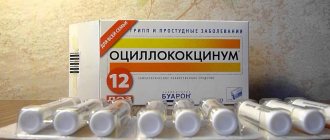Composition of the drug
The undoubted advantage of the medicine is its natural composition.
The active ingredient of Hofitol is artichoke leaf extract. The active component of the drug has a multifactorial effect on the patient’s metabolic processes. The extract contains a substance called Cynarin. This component is a choleretic - it increases the concentration of bile acids in bile. Due to this effect, improved liver function and digestion are achieved. Cynarin also has an antioxidant effect, protecting organ cells from toxins and other harmful substances. The drug stimulates the regeneration of liver tissue and prevents its diseases.
Hophytol affects all parts of the gastrointestinal tract, stimulating their work. The medicine eliminates muscle spasms in the gastrointestinal tract, which reduces pain. Artichoke leaves have a detoxifying effect; they help remove harmful substances from the feces.
Attention! Taking Hofitol during pregnancy is possible only after consultation with a doctor; independent use of the drug is strictly prohibited.
Artichoke leaves are a natural diuretic. The medication removes excess fluid from the body, significantly reducing the amount of edema. Hofitol removes harmful products from the blood, which facilitates kidney function. The medicine does not contribute to potassium loss, so it can be used for a long time.
The medication affects metabolism throughout the body. The drug reduces the amount of low-density lipoproteins in the blood, which prevents atherosclerosis. Hofitol improves the metabolism of salts and carbohydrates, due to which the medication prevents the development of diabetes mellitus and other metabolic diseases.
Chofitol during pregnancy: basic concepts
Pregnancy is not only the most wonderful time of waiting for a baby, but also a time of crazy stress on a woman’s body. Therefore, during pregnancy, not only old diseases resurface, but new diseases arise very quickly. And the liver is no exception.
Under the influence of toxicosis, liver resources quickly deplete
Changes that occur in a woman’s body during pregnancy can lead to disturbances in liver function. This is especially evident during the first trimester, when hormone levels increase sharply. Then Hofitol is prescribed for the treatment or prevention of liver diseases.
Composition, principle of action and release form of Hofitol
Chophytol is a herbal preparation based on artichoke extract.
In modern pharmacology, artichoke leaves and roots are used to prepare choleretic drugs.
Artichoke is a perennial plant that contains many beneficial substances:
- fiber;
- folic acid;
- magnesium;
- potassium;
- phosphorus;
- iron;
- vitamins: C;
- K;
- B6.
And the most important substance that is part of the artichoke is cynarin, which has the following properties.
Table: properties of artichoke
| Properties of artichoke | The effect of artichoke |
| Diuretic | Accelerates the removal of urine from the body |
| Hypoazotemic | Reduces blood ammonia levels |
| Cholikinetic | Improves the flow of bile by increasing the tone of the gallbladder |
Hofitol's medical indications are very diverse. It is prescribed for:
- restoration of the metabolism of cholesterol and other fats in the liver;
- reducing urea levels in the blood;
- restoration of the structure of liver cells;
- removal of toxins from the liver and biliary tract;
- increased urination;
- normalization of digestion;
- improving general metabolism in all tissues and organs.
Hofitol is available in three types:
- Pills.
- Solution for oral administration.
- Injection.
Hofitol is a herbal preparation actively used to treat pregnant women.
The use of Hofitol in early and late pregnancy, the effect on the fetus
Due to the fact that Hofitol is a herbal preparation, and its active ingredient artichoke extract does not pose a threat to a pregnant woman and the unborn child, the drug is actively used for the treatment and prevention of liver diseases in the expectant mother throughout pregnancy.
In the first trimester, Hofitol is used to combat toxicosis, in the second - against edema, in the third - against gestosis.
All medications can only be prescribed to a pregnant woman by a doctor.
Conducted studies of the drug did not reveal a negative effect of Hofitol on the health of the unborn child. Children whose mothers took Hofitol during pregnancy were born healthy and developed.
Release form and expiration date
Hofitol has 2 release forms: tablets and oral solution. The first type of drug contains a special shell consisting of gelatin. Hofitol tablets contain 0.2 grams of active substance. The drug is sold in cardboard packages containing blisters or tubes.
Hofitol in the form of an internal solution is sold in a cardboard package containing a bottle of 120 milliliters. One piece contains 24 grams of active substance, ethyl alcohol, glycerin, flavorings.
The medicine in both forms of release must be kept away from children. The drug cannot be used after the expiration date of 36 months. Hofitol is recommended to be stored in a dark and cool place.
Use of Hofitol by pregnant women. Contraindications and analogues.
You are here: Home > Articles > Pregnancy and childbirth > Health
April 28, 2014 | views: 7,368
During pregnancy, a woman receives many medications, sometimes even for prophylactic purposes. Often the disease is easier to predict than to treat. Therefore, the doctor can prescribe you a herbal preparation in the absence of any manifestations of the disease. One such medicine is Hofitol.
The main substance of Hofitol is an extract from an aqueous extract of artichoke.
Instructions for use
EXPAND INSTRUCTIONS
Release form, composition and packaging
Brown film-coated tablets, round, biconvex.
| 1 tab. | |
| dry aqueous extract of fresh artichoke leaves | 200 mg |
Excipients: magnesium trisilicate, corn starch, talc, magnesium stearate.
Shell composition: gum lacquer, rosin, talc, gelatin, sucrose, calcium carbonate, carnauba wax, polysorbate 80, dispersed dye (sucrose, yellow, black and brown iron oxides (E172), methyl parahydroxybenzoate (E218), ethyl parahydroxybenzoate (E214)).
12 - blisters (5) - cardboard packs. 30 - blisters (2) - cardboard packs. 30 - blisters (6) - cardboard packs. 60 - polypropylene (1) - cardboard packs. 180 - polypropylene (1) - cardboard packs.
The solution for oral administration is dark brown, opaque, with a slight yellowish sediment; There may be some sediment during storage.
| 1 ml | |
| thick aqueous extract of fresh artichoke leaves | 200 mg |
Excipients: ethanol, orange flavor, glycerol, methyl parahydroxybenzoate, propyl parahydroxybenzoate, purified water.
120 ml - dark glass bottles (1) - cardboard packs.
Clinical and pharmacological group
Herbal medicine with choleretic and diuretic effect, reducing azotemia
Registration No.
[The drug is approved for use as an over-the-counter product] tablets, coated, 200 mg: 60 or 180 - P N013320/01, 01.11.08. Validity period of reg. beat is not limited. [The drug is approved for use as an over-the-counter product] oral solution 200 mg/1 ml: vial. 120 ml - P N013320/02, 12/11/07. Validity period of reg. beat is not limited.
pharmachologic effect
Herbal preparation. The pharmacological effect of the drug is due to the complex of biologically active substances contained in the leaves of the field artichoke. Cynarin in combination with phenolic acids has a choleretic and hepatoprotective effect. Ascorbic acid, carotene, vitamins B1 and B2, inulin help normalize metabolic processes.
It also has a diuretic effect and enhances the excretion of urea.
Pharmacokinetics
The effect of the drug Hofitol is the combined effect of its components, so kinetic observations are not possible; Collectively, the components cannot be traced using markers or bioassays. For the same reason, it is impossible to detect drug metabolites.
Indications for use of the drug HOFITOL
As part of complex therapy:
- dyskinesia of the biliary tract of the hypokinetic type;
- chronic non-calculous cholecystitis;
- chronic hepatitis;
- cirrhosis of the liver;
- chronic nephritis;
- chronic renal failure.
Dosage regimen
Adults are prescribed 2-3 tablets or 2.5-5 ml of oral solution 3 before meals. The course of treatment is 2-3 weeks.
Children over 6 years old, depending on age, are prescribed 1-2 tablets 3 before meals. Oral solution, depending on age, is prescribed 1/4-1/2 of the dose used in adults, 3 before meals. The course of treatment is 2-3 weeks.
The doctor determines the need for repeated courses of therapy individually.
Side effect
From the digestive system: diarrhea may develop with prolonged use of the drug in high doses.
Other: allergic reactions.
Contraindications to the use of the drug HOFITOL
- cholelithiasis;
- obstruction of the bile ducts;
- acute diseases of the liver, kidneys, biliary and urinary tracts;
- children under 6 years of age (for tablets);
- hypersensitivity to the components of the drug.
Use of the drug HOFITOL during pregnancy and breastfeeding
The use of Hofitol during pregnancy and lactation (breastfeeding) is possible only under the supervision of a physician.
Use for liver dysfunction
The use of the drug is contraindicated in case of obstruction of the biliary tract, cholelithiasis, acute diseases of the liver and biliary tract.
Use for renal impairment
Contraindicated in acute kidney disease.
special instructions
Long-term use of the drug in high doses increases the risk of developing diarrhea.
Overdose
Symptoms: possible increased side effects.
Drug interactions
Drug interactions with Hofitol have not been described.
Conditions for dispensing from pharmacies
The drug is approved for use as a means of OTC.
Storage conditions and periods
The drug should be stored out of the reach of children at a temperature not exceeding 25°C. The shelf life of the tablets is 3 years; oral solution - 4 years.
What is the effect of Hofitol?
The drug belongs to the group of bioflavonoids and has the following properties:
- Reduces blood cholesterol levels;
- Restores fat metabolism;
- Reduces levels of liver enzymes (ALT, AST);
- Increases blood protein levels;
- Reduces bilirubin and creatinine levels;
- Increases the flow of bile;
- Restores liver cells;
- Improves kidney function and enhances the elimination of harmful substances;
- Improves blood properties;
- Normalizes microcirculation in blood vessels;
- Activates oxygen exchange processes.
This drug is not used for emergency treatment, that is, it is taken in courses for a long time in order for a positive result to appear.
Diseases are easier to predict and prevent than to treat. Hofitol is often used to prevent pathological conditions during pregnancy.
Preconception preparation
The drug may be part of a complex of preparations for pregnancy (pre-pregnancy preparation). During this period, all body systems must be brought into a physiological state. Hofitol affects metabolic processes. This drug is especially indicated for women with:
- Miscarriage;
- Preeclampsia during pregnancy and placental insufficiency in previous pregnancies;
- Female infertility;
- In preparation for IVF, some clinics prescribe Hofitol;
- Diseases of the kidneys, liver or metabolic disorders.
Before conception, it is recommended to take 2-3 tablets 3 times a day for 3 weeks.
Early toxicosis of pregnant women
This is a condition that almost every pregnant woman has encountered. Nausea, vomiting and intolerance to the smell of even your favorite coffee in the morning suggest pregnancy to some. Sometimes this disease is very pronounced and the pregnant woman cannot lead her usual lifestyle.
For severe symptoms of toxicosis, it is recommended to take 1 teaspoon of Hofitol solution 3 times a day, diluted in a quarter glass of water. And after the condition improves, 2-3 tablets three times a day before meals. There are situations when taking medications for nausea during pregnancy leads to the opposite effect. In this case, an individual approach to treating a woman is necessary.
Treatment and prevention of gestosis
Preeclampsia is a disease that occurs only during pregnancy. There are a lot of theories about the occurrence of gestosis. But the mechanisms of development have long been studied. Preeclampsia is associated with impaired liver function, which leads to changes in the permeability of the vessel wall. As a result of these processes, edema occurs in the pregnant woman, since the liquid part of the blood leaves the vessel into the tissue and the lumen narrows, which leads to an increase in blood pressure. Violation of microcirculation in the vessels of the kidneys is manifested by the release of protein in the urine. Hofitol is prescribed as an additional or maintenance therapy after the main treatment.
Pregnant women with a high likelihood of developing preeclampsia, for whom prevention with Chofitol is indicated:
- Pregnant women with cardiovascular diseases (arterial hypertension, heart defects);
- With kidney diseases (pyelonephritis, glomerulonephritis, anomalies of kidney development);
- With liver diseases (hepatosis, hepatitis, cholecystitis);
- Obese women;
- Pregnant women with diseases of the endocrine systems (diabetes mellitus, thyroid diseases);
- The woman's age is less than 18 years and more than 32;
- Pregnancy with two or more children;
- Chronic infectious process;
- With social problems (unregistered marriage, low income, poor living conditions).
For the purpose of prevention and treatment of gestosis, 2 tablets are prescribed 3 times a day for 3-4 weeks. Preventive courses are carried out three times during pregnancy. It is recommended to repeat the treatment after a month.
Fetoplacental insufficiency
The consequence of gestosis may be placental insufficiency. This condition during pregnancy is a consequence of many diseases, both during pregnancy and long before it. The essence of this disease is the disruption of the delivery of nutrients and oxygen to the fetus. Most often nothing bothers a pregnant woman. Sometimes the expectant mother may notice a lack of growth in the abdomen, which indicates a delay in the baby’s growth or changes in movements (the fetus may move too vigorously or “sleep” all day). For some time, the baby compensates for the lack of nutrition, but over time it stops growing, and its nervous and cardiovascular systems begin to suffer.
Risk groups for the development of placental insufficiency include pregnant women who are at risk of gestosis and women who often suffer from infectious diseases, especially during the period of placenta formation (up to 16-20 weeks). The prevention and treatment regimen with Hofitol is similar to the courses for gestosis.
Prescription of Hofitol for miscarriage
Hofitol, as an adjuvant, can be prescribed by your doctor if there is a threat of termination of pregnancy at any time. Scientific studies have proven that a group of women taking this drug had fewer premature births.
For dermatoses of pregnant women
Dermatoses in pregnant women are a common disease. Manifested by rashes or eczema, itchy skin. Symptoms disappear almost immediately after childbirth. This condition is associated with the response of the body’s immune system and metabolic disorders of essential substances.
The standard treatment regimen is 2-3 tablets 3 times a day. After the course, you need to take a break for 2-3 weeks, and then repeat the treatment.
For liver diseases and gestational diabetes mellitus
Viral hepatitis, hepatosis and cholestasis in pregnant women. Liver diseases during pregnancy are aggravated due to an even greater load on this organ. To maintain the functions and restore liver cells, the therapist can prescribe Hofitol from the first days of pregnancy.
Take 2-3 tablets 3 times a day for at least a month.
Gestational diabetes mellitus is a disorder of carbohydrate metabolism caused by pregnancy. As a rule, diabetes mellitus goes away with the birth of a child, but sometimes it can become a permanent form of the disease.
Standard dosages are used for up to 2 months and the course is resumed after a 2-3 week break.
How to treat kidney diseases using Hofitol
Diseases of the kidneys and urinary system are very dangerous for a pregnant woman and her unborn baby. In conditions of reduced immunity, the infection appears and spreads very quickly. Gestational pyelonephritis is an infectious kidney disease that first appears during pregnancy and most often the symptoms disappear after childbirth.
Hophytol is prescribed along with antibacterial therapy according to the standard regimen.
Contraindications
There are contraindications for Hofitol, as for all other drugs. Pregnant women who have:
- There is increased individual sensitivity to the components. Women often complain of nausea and vomiting;
- In case of gallstone disease. May provoke an attack of colic;
- Allergic reaction to the drug;
- Severe degrees of liver and kidney diseases.
Hofitol is available in tablets, injection solution and oral solution. Chofitol is not used in injection form during pregnancy.
Similar drugs
If a woman has contraindications or is intolerant to Hofitol, other medications are prescribed according to indications.
Essentiale. A drug whose action is aimed at preserving and helping the liver function. The product is a liver cell protector. It contains lipoproteins. Essentiale is prescribed for all diseases that Hofitol treats. Side effects may also include nausea and vomiting.
Curantil (Dipyridamole) is a pharmacological agent that improves blood properties (thin) and increases microcirculation in the vessels of the mother and fetus. Dipyridamole is prescribed for placental insufficiency, gestosis, and early toxicosis. It is used extremely rarely as a prophylactic agent. Contraindications for use are heart disease, including rhythm disturbances, decreased blood clotting ability, and allergic reactions. Individual intolerance to Curantil is quite common.
Canephron, like Hofitol, is a herbal remedy. Canephron has a greater effect on the kidneys:
- Diuretic effect;
- Anti-inflammatory;
- Reduces protein excretion in urine. What is important for gestosis;
- Relieves swelling in “gestational” patients;
- Has a relaxing effect on the muscles of the urinary system;
- It is uroseptic. Destroys even antibiotic-resistant bacteria.
The medicine comes in two forms and is available in tablets and drops.
Pregnancy is a physiological condition and is not a disease, but sometimes it is necessary to help a woman’s body endure such grandiose changes without loss.
Leave your comment: Cancel
Indications for use
Hofitol during pregnancy is prescribed for immediate indications for pathologies of the hepato-biliary (hepatobiliary) system. Usually the drug is taken for:
- hypokinesis of the bile ducts;
- chronic inflammation of the gallbladder without the presence of stones;
- fatty hepatosis;
- sclerosis of liver cells;
- liver failure in the stage of compensation.
The drug can also be used for the treatment and prevention of gastrointestinal pathologies. The drug is indicated for use in cases of increased gas formation, belching, heartburn, constipation, nausea, and pain.
Hofitol can be used for pathologies of the urinary system associated with deterioration of its functioning. The drug is indicated for the treatment of poisoning, edema, nephrosclerosis, chronic renal failure (chronic renal failure). The medicine is also used to treat chronic inflammatory processes in the kidneys.
Hofitol for pregnant women is indicated to get rid of many unpleasant symptoms of gestation. The drug is used for toxicosis, heartburn, stool retention, gas formation, and digestive disorders. Taking the drug is indicated for certain pathologies during pregnancy: gestational arterial hypertension (late toxicosis of pregnancy), fetal hypoxia, fetoplacental insufficiency, delayed growth and development of the unborn child.
The use of "Hofitol" for early toxicosis
One of the common reasons for prescribing “Hofitol” during pregnancy is to alleviate a woman’s condition with toxicosis, which develops in the first trimester.
During this period, the body adapts to new operating conditions, and all its systems are restructured to operate in a mode that ensures the normal development of the fetus that is taking hold and forming in the uterus. The changes are especially acute in the state of the endocrine and nervous systems and in the functioning of the gastrointestinal tract. Nausea and vomiting are common in pregnant women in the first 12 weeks of pregnancy. To eliminate unpleasant symptoms, expectant mothers are prescribed Hofitol (usually in combination with other medications). In the early stages it has the following positive effects:
- improves hepatic metabolism, thereby facilitating effective work to neutralize the effects of toxins;
- eliminates bile stagnation, which leads to a reduction in attacks of nausea;
- copes with such manifestations of toxicosis as loss of appetite.
Effect of the drug on the fetus
The medicine has a natural composition, so it should not affect embryogenesis. Experiments on animals revealed that the drug does not cause intrauterine death or congenital developmental abnormalities in embryos.
Despite the safety of the drug, you should take it with extreme caution in the first fourteen weeks of pregnancy. During this period, the formation of the baby’s kidneys, heart, brain and other organs is observed. External factors can cause disruptions in these processes, which will lead to the development of congenital diseases. At later stages of gestation, the drug can be safely used to treat various pathologies.
Instructions for use
The average dosage of the product in solution form is half a teaspoon three times a day. The duration of treatment depends on the disease, usually it is 20 days. The medication should be taken 15 minutes before eating.
According to the instructions, the average dose of Hofitol in tablets is 6 pieces for 3 doses. Sometimes doctors increase the amount of the drug to 9 tablets per day. The average duration of therapy is 20 days. The medicine should be taken 10 minutes before eating. Before repeating the course of treatment, you should consult your doctor.
How will Hofitol help expectant mothers?
Hofitol contains only plant components, so it is safe for the expectant mother and the developing fetus. The main component of the medicine is artichoke leaves, which, in combination with phenolic acids, have a powerful hepatoprotective effect on the human body. This effect allows you to reduce the severity of attacks of nausea (especially in the first trimester) and flatulence. Hofitol also helps prevent the development of digestive disorders. associated with insufficient production of bile and its retention in the ducts.
The drug also accelerates the removal of urea from the body. This allows pregnant women to avoid swelling, which most often appears in the 3rd trimester.
Artichoke leaves are rich in valuable substances: B vitamins, carotene and beneficial microelements. These components normalize metabolism. When taking Hofitol, a woman will be able to avoid a problem that occurs in almost all pregnant women - gaining extra pounds.
Hofitol also has other positive effects on the body of expectant mothers:
- normalizes carbamide levels in the blood;
- prevents the development of aviminosis;
- improves the production of coenzymes by liver cells;
- frees the body from harmful substances: toxins, heavy metal salts.
What dosage is considered optimal during pregnancy?
How to take Hofitol during pregnancy? The optimal dosage of tablets during pregnancy is 500 mg/day. The medicine is usually taken for three weeks.
In the form of an oral solution, Hofitol is taken three times a day, a teaspoon (5 ml). The course of treatment is usually about two weeks.
Use of Chofitol during lactation
Data on the safety of use of the product during breastfeeding are not provided.
Side effects
Typically, Hofitol rarely causes side effects. Sometimes, while taking medication, a person may experience digestive disorders. The most common problem among them is stool problems in the form of diarrhea. Less commonly, the patient is bothered by nausea, bloating, and pain.
Very rarely, while taking the drug, the patient experiences side effects from the central nervous system. These include increased excitability, decreased memory, coordination disorders and static. Also, the drug can provoke mood swings, nervousness, and apathy.
In exceptional cases, Hofitol causes allergic reactions in patients. They usually appear as skin rashes with itching. Allergies can also manifest themselves as angioedema of the lips, skin, and larynx. In isolated cases, taking the medication causes a systemic reaction such as anaphylactic shock.
Hofitol's analogs
Cholebil is an analogue of Hofitol, containing artichoke leaf extract. The medicine is sold in the form of capsules containing 400 mg of the active ingredient. The drug is prescribed for pathologies of the hepatobiliary system and kidneys in any trimester of gestation in the absence of contraindications. The drug is also indicated for the treatment of early and late toxicosis of pregnancy, insufficient blood supply to the placenta.
Allochol is a modern drug that has several components. The medicine is available in the form of tablets with a special coating that prevents them from dissolving before entering the small intestine. The medication is prescribed for pathologies of the hepatobiliary system, as well as for constipation. The drug has a natural composition, so it can be used at any stage of pregnancy after a doctor’s permission.
Essentiale is a medicine with an active component in the form of phospholipids. The drug is intended for the treatment of liver diseases of any etiology; it promotes normal cell regeneration. During pregnancy, the drug can be used to treat toxicosis. Essentiale is sold in pharmacies in the form of capsules and solution for intravenous administration. The drug can be used at any stage of pregnancy under the supervision of a doctor.
Canephron is a herbal diuretic containing extracts of centaury, lovage and rosemary. The medication is sold in pharmacies in the form of an oral solution and tablets. The drug is prescribed for edema and chronic diseases of the kidneys and urinary tract. The medicine can also be used as a means of preventing the formation of stones. Canephron is approved for use at any stage of pregnancy as prescribed by a doctor.
Curantil is a drug whose active component is the substance Dipyridamole. The drug belongs to the class of antiplatelet agents and correctors of microcirculation disorders. The medication is indicated for the treatment of heart attacks, strokes, embolisms, etc. During pregnancy, the drug is prescribed for pathologies of the placental blood supply to the unborn child.
Features of the drug
"Hofitol" is found in pharmacies in three dosage forms.
- The most popular over-the-counter option are round, convex brown tablets , which are sold in 60 and 180 pieces per pack.
- No less popular is the solution intended for oral administration. This is a brown, opaque liquid with a yellowish sediment, available without a prescription in 120 ml glass bottles.
- The third version of the drug is an injection form . This “Hofitol” is produced in 5 ml ampoules and is sold in 5 or 12 ampoules per pack. The solution inside the ampoule is transparent and yellow in color, which can be either dark or barely noticeable. To purchase such a medicine, you need a prescription from a doctor.
Each form of the medicine contains an extract from artichoke leaves, which is the active substance of “Hofitol”. 100 ml of liquid for internal use contains 20 g of extract (it is aqueous), and one tablet contains 200 mg of dry extract.
The dosage of purified extract from artichoke leaves in one ampoule of injection solution is 100 mg.
The inactive components in different forms of the drug differ. Liquid Hofitol, which is taken orally, contains parabens, ethyl alcohol, orange flavor, glycerin and water. The only auxiliary ingredient of the injection solution is sterile water. In the core of the tablets, the plant extract is combined with talc, magnesium trisilicate, corn starch and magnesium stearate, and the hard “Hofitol” shell is made of calcium carbonate, sucrose, carnauba wax and a number of other substances.










